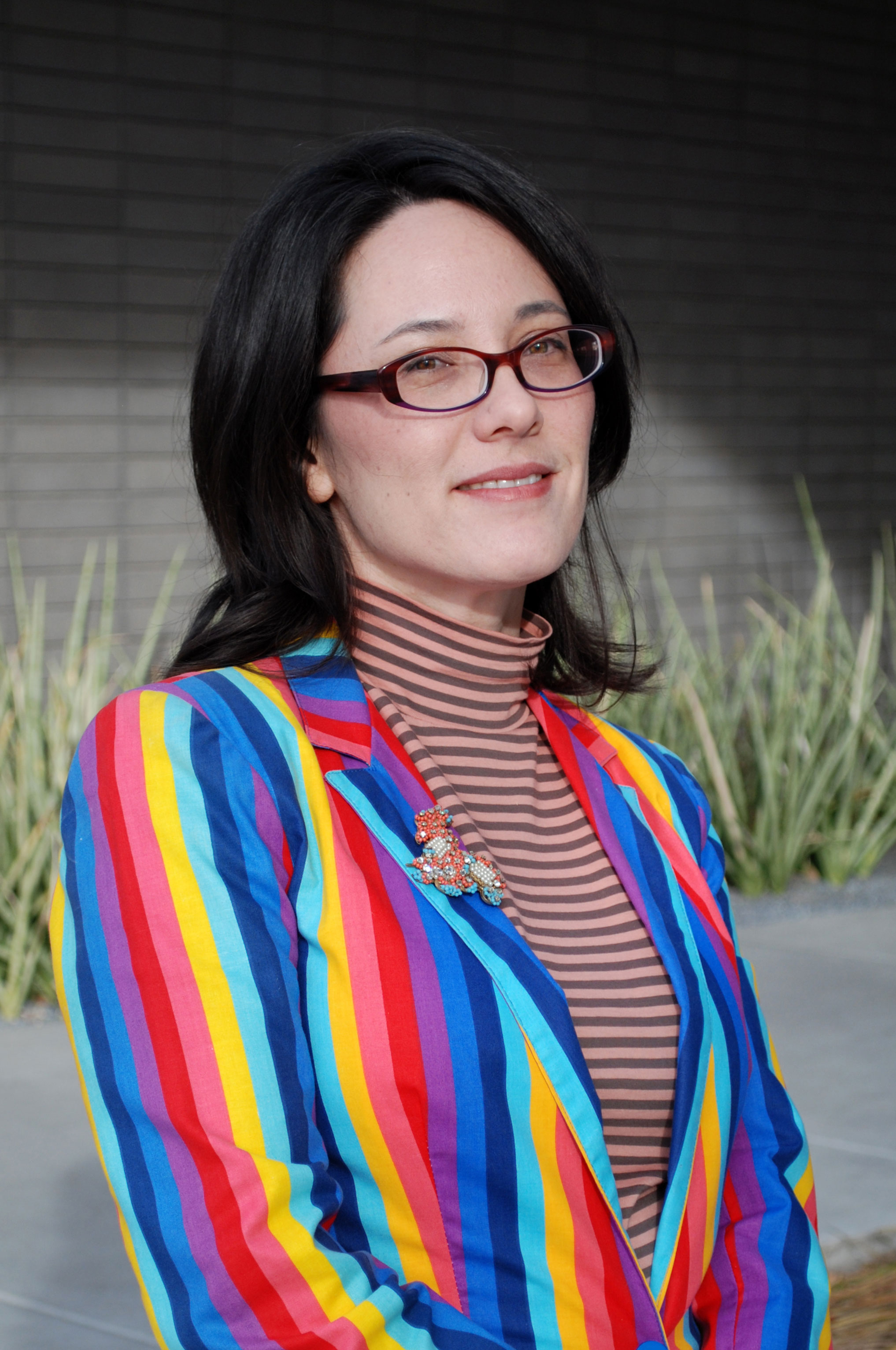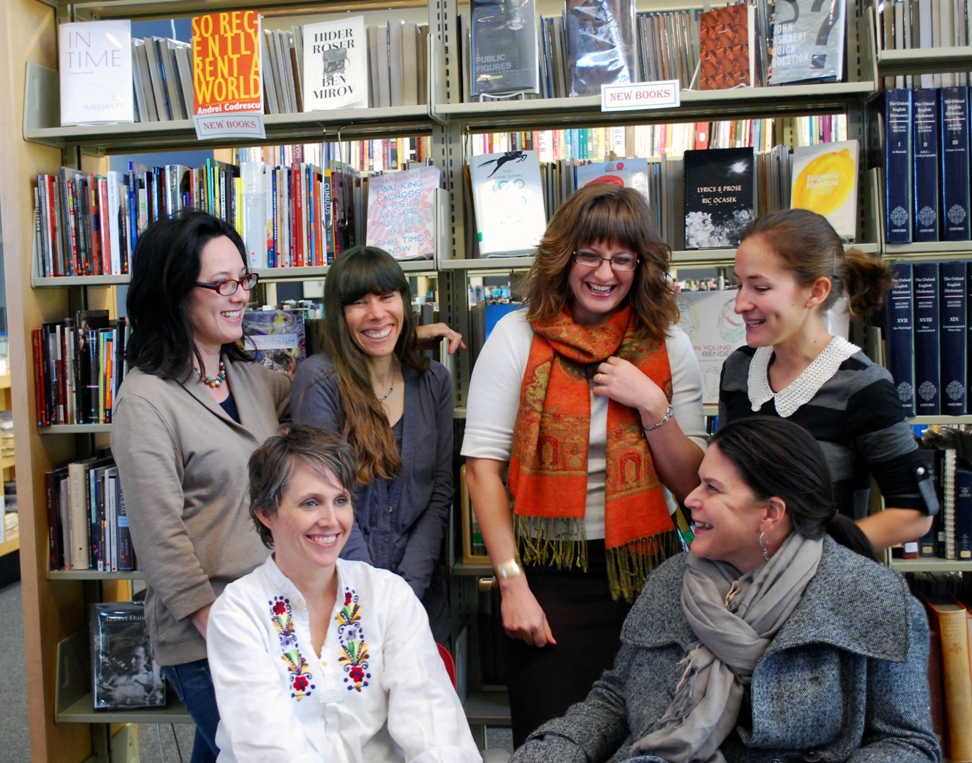Cybele Knowles works as a program coordinator at the University of Arizona Poetry Center, where she coordinates the PW-funded Center’s Reading and Lecture Series, Classes & Workshops program, and Closer Look Book Club. She holds an MFA in fiction from the University of Arizona and an MA in English from U.C. Berkeley. Her poetry and prose have appeared in the Destroyer, Spiral Orb, Diagram, Pindeldyboz, the Asian Pacific American Journal, Faucheuse, and the Prose Poem.
 The University of Arizona Poetry Center is run by a staff of eight arts administrators and librarians with specializations in education, grant writing, fundraising, marketing, and more. Most of us work full-time and, being employed in the nonprofit sector, we work intensively. Each of us also has an important other job: We are all poets and writers.
The University of Arizona Poetry Center is run by a staff of eight arts administrators and librarians with specializations in education, grant writing, fundraising, marketing, and more. Most of us work full-time and, being employed in the nonprofit sector, we work intensively. Each of us also has an important other job: We are all poets and writers.
Here’s where the phrase “finding a balance” tends to get yoked up. That tired old plowhorse. For me, the phrase “finding a balance” evokes a delicate and precise action, like a jeweler weighing out diamonds by the milligram. But I experience the process of negotiating between the roles of worker and writer as…somewhat more rough. For me it’s like being a perpetual beginner on the balance beam—falling off, landing hard (puff of chalk dust), and then getting back up, but this time with a sore butt. And repeat.
I asked my coworkers how they manage the demands of their day jobs, their calling as a writer, and all the other business of being human. They had wonderful responses, some practical and some perceptual, but all helpful and genuine.
Renee Angle, Programs Coordinator: When I get down about how much I’m not writing, I think of my heroes: Frank O’Hara who wrote in short bursts and did not seek out publications or residencies but the company of other artists; William Carlos Williams who became a doctor because he wanted to write and write what he wanted, not what a publisher expected; and Wallace Stevens who worked all day in order to come home to a fabulously expensive library each night. But then, of course, my heroes did not care for young children as I do. So, I think of my heroines: Sor Juana Inéz de la Cruz who devoted her whole life to reading and writing despite extreme pressure to do otherwise and Anne Bradstreet who wrote poems without a microwave or dishwasher.
Allie Leach, Education Programs Assistant: For me, staying focused and on track with my writing is super hard without deadlines and encouragement. For that reason, having a writer’s group has been a life saver. Not only do we hold each other accountable with oral and written feedback, but we are also cheerleaders for each other. Another plus: Our meetings always include wine and cheese (and sometimes cupcakes).
Sarah Kortemeier, Library Specialist: My solution so far has been twofold: First, to create a regular block of time for writing and another for submitting, both once a week; second, to give myself permission to devote free moments outside those times to other activities. When I was in graduate school, I tried to write every day, and I’ve had to accept the fact that that schedule isn’t very productive for me (I seem to need a lot of space around my writing time). A “writing morning” once a week, on the day I work the late shift in the library, is the best compromise I’ve come up with.
Julie Lauterbach-Colby, Development Program Coordinator: I would honestly get depressed if I were to treat only the time I actually sat at my computer and wrote as writing time. The guilt, the shame by comparison as I hear love stories between other writers and the weekly six-hour stints they have at their computers. So I’ve had to retrain my brain to “practice” writing in everyday ways: by thinking, by looking, and focusing on everyday scenes, conversations, stories, images, and treating those as written opportunities. I carry these scenes with me in my head. I mull them over. If I’m around my notebook, I write them down and then I think about them some more until they’ve manifested in my mind as something more solid. Sometimes this could be just a word: I’ll focus on, say, speed, and like a practice in mindfulness breathing, that word will become a way to constantly “return to writing” throughout my day. It’s like Pinterest, but in my head.
Annie Guthrie, Marketing Director: I try and banish entirely any dichotomous inner argument about time/not enough time, which I have found to be a seductive whirlpool of a time-waster in itself. “Not having time” is a cultural spell I’d like to undo. It’s a spell that becomes a chant. I am interested in seeing what I can do with the time I do have, and how I can come into it, my life, as a writer all the time. For example, if I can become more alert and more observant and more thinking and more feeling during even the most mundane of tasks, then I feel I am making the most of my time.
Speaking for myself: I've worked as a desk jockey for years in a variety of professions, and I've found that compared to any other job I've held, working in literary arts administration is, itself, a great support to my writing. The job and the calling synergize. As an example, every day at the office I have the opportunity to think and talk about literature with the talented working writers quoted above. That’s pretty fabulous.
Top Photo: Cybele Knowles. Credit: Allie Leach. Photo: (back row) Cybele Knowles, Wendy Burk, Sarah Kortemeier, Allie Leach; (front row) Renee Angle and Annie Guthrie. Credit: Meg Wade.
Support for Readings/Workshops events in Tucson is provided by an endowment established with generous contributions from the Poets & Writers Board of Directors and others. Additional support comes from the Friends of Poets & Writers.






